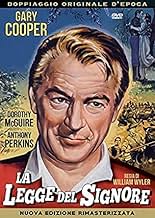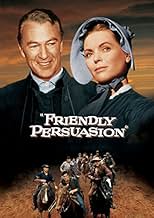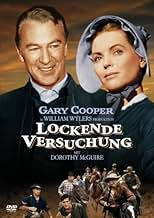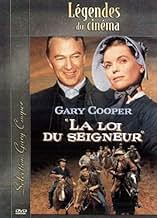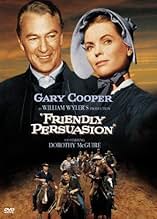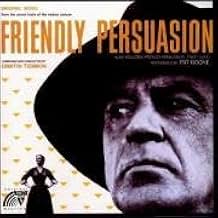PUNTUACIÓN EN IMDb
7,3/10
8 mil
TU PUNTUACIÓN
La actitud pacifista de una familia cuáquera se pone a prueba como consecuencia de la guerra de Secesión.La actitud pacifista de una familia cuáquera se pone a prueba como consecuencia de la guerra de Secesión.La actitud pacifista de una familia cuáquera se pone a prueba como consecuencia de la guerra de Secesión.
- Nominado para 6 premios Óscar
- 5 premios y 11 nominaciones en total
Peter Mark Richman
- Gard Jordan
- (as Mark Richman)
James Anderson
- Poor Loser Dunked by Jess
- (sin acreditar)
Argumento
¿Sabías que...?
- CuriosidadesGary Cooper originally did not want to play a father of grown children. This was despite the fact that he was 55 in real life. Ironically, many critics in 1956 felt he looked too old to play Jess Birdwell.
- PifiasThe Minneapolis steam engine at the fair is too new for the Civil War era.
- Citas
Jess Birdwell: I'm just his father, Eliza, not his conscience. A man's life ain't worth a hill of beans except he lives up to his own conscience.
- ConexionesFeatured in Family Classics: Family Classics: Friendly Persuasion (1963)
- Banda sonoraFriendly Persuasion (Thee I Love)
(1956)
Music by Dimitri Tiomkin
Lyrics by Paul Francis Webster
Sung by Pat Boone
Dot Recording Artist
sung during the opening credits and at the end
Played often in the score and occasionally sung by a chorus
Reseña destacada
Greetings again from the darkness. Released in 1956, this William Wyler film holds up today because some of the debate and dilemmas touched on remain unresolved 57 years (and numerous wars) later. The film takes place in 1860's Indiana as the Civil War rages. The story is told from the perspective of a pacifist Quaker family and is based on the 1945 book by Jessamyn West.
The patriarch of this Quaker family is played by Gary Cooper, who was four years past his Oscar winning performance in High Noon, and five years from his death due to cancer. His wife, the Minister Eliza, is played well by Dorothy McGuire, who the following year would play the mother in Old Yeller. The film's best performance comes from young Anthony Perkins (his second film) who of course made cinematic history as Norman Bates in the 1960 classic Psycho. Both of these Perkins characters share mommy issues and complicated decisions of conscience.
The opposition to war and violence is the main theme here, and there have been many interpretations over the years. Is it religious belief or fear that prevents the men from joining the cause? At least Perkins' character is honest enough to wonder. Cooper kind of plays against type here since he was so often a man of movie action, but in reality his strength of character and belief allows him to maintain his image.
Comedy relief is at hand given the youngest son's ongoing battle with Samantha the Goose, a family pet with devious attack modes. And daughter Mattie, played by Phyllis Love, falls madly in love with a soldier played by Peter Mark Richman. See, every character has their own personal battles and decisions regarding conscience and violence.
The great Margaret Main has a sequence as a single mother of three daughters (every one a gem!). The daughters introduce Cooper and Perkins to the joys of music ... forbidden by the Quaker church. One of the daughters is played by Marjorie Durant, whose father was a writer and assistant to Charlie Chaplin. Her grandmother married EF Hutton, so Ms. Durant could have spent a great deal of time researching her only family stories.
While it's difficult to understand these days, screenwriter Michael Wilson was not originally credited for his work. He was on the Hollywood Blacklist, and his screen credit was not reinstated until 1996. William Wyler was one of the most successful directors in Hollywood history and his resume includes Jezebel, Mrs Miniver, The Best Years of Our Lives, and of course, Ben-Hur. Though this movie was nominated for 6 Academy Awards, it didn't win any and lost out to Best Picture winner Around the World in 80 Days. A final note of interest, this was Ronald Reagan's favorite movie and he presented a copy to Mikhail Gorbachev in hopes the message would prove the downside to war.
The patriarch of this Quaker family is played by Gary Cooper, who was four years past his Oscar winning performance in High Noon, and five years from his death due to cancer. His wife, the Minister Eliza, is played well by Dorothy McGuire, who the following year would play the mother in Old Yeller. The film's best performance comes from young Anthony Perkins (his second film) who of course made cinematic history as Norman Bates in the 1960 classic Psycho. Both of these Perkins characters share mommy issues and complicated decisions of conscience.
The opposition to war and violence is the main theme here, and there have been many interpretations over the years. Is it religious belief or fear that prevents the men from joining the cause? At least Perkins' character is honest enough to wonder. Cooper kind of plays against type here since he was so often a man of movie action, but in reality his strength of character and belief allows him to maintain his image.
Comedy relief is at hand given the youngest son's ongoing battle with Samantha the Goose, a family pet with devious attack modes. And daughter Mattie, played by Phyllis Love, falls madly in love with a soldier played by Peter Mark Richman. See, every character has their own personal battles and decisions regarding conscience and violence.
The great Margaret Main has a sequence as a single mother of three daughters (every one a gem!). The daughters introduce Cooper and Perkins to the joys of music ... forbidden by the Quaker church. One of the daughters is played by Marjorie Durant, whose father was a writer and assistant to Charlie Chaplin. Her grandmother married EF Hutton, so Ms. Durant could have spent a great deal of time researching her only family stories.
While it's difficult to understand these days, screenwriter Michael Wilson was not originally credited for his work. He was on the Hollywood Blacklist, and his screen credit was not reinstated until 1996. William Wyler was one of the most successful directors in Hollywood history and his resume includes Jezebel, Mrs Miniver, The Best Years of Our Lives, and of course, Ben-Hur. Though this movie was nominated for 6 Academy Awards, it didn't win any and lost out to Best Picture winner Around the World in 80 Days. A final note of interest, this was Ronald Reagan's favorite movie and he presented a copy to Mikhail Gorbachev in hopes the message would prove the downside to war.
- ferguson-6
- 28 dic 2013
- Enlace permanente
Selecciones populares
Inicia sesión para calificar y añadir a tu lista para recibir recomendaciones personalizadas
- How long is Friendly Persuasion?Con tecnología de Alexa
Detalles
- Fecha de lanzamiento
- País de origen
- Idioma
- Títulos en diferentes países
- Friendly Persuasion
- Localizaciones del rodaje
- Empresas productoras
- Ver más compañías en los créditos en IMDbPro
Taquilla
- Presupuesto
- 3.000.000 US$ (estimación)
- Duración2 horas 17 minutos
- Color
- Relación de aspecto
- 1.75 : 1
Contribuir a esta página
Sugerir un cambio o añadir el contenido que falta

Principal laguna de datos
By what name was La gran prueba (1956) officially released in India in English?
Responde

